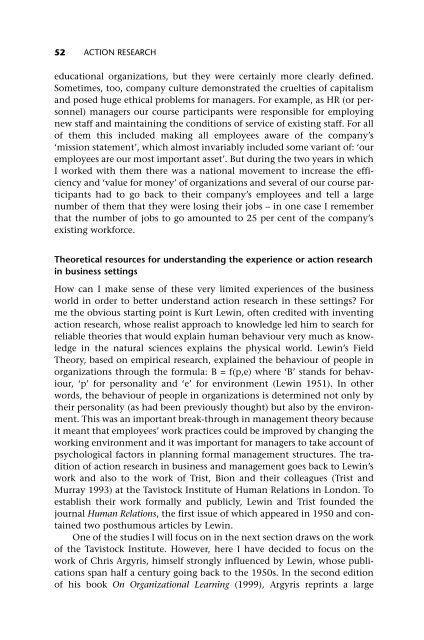Action Research A Methodology for Change and Development
Action Research A Methodology for Change and Development
Action Research A Methodology for Change and Development
Create successful ePaper yourself
Turn your PDF publications into a flip-book with our unique Google optimized e-Paper software.
52 ACTION RESEARCH<br />
educational organizations, but they were certainly more clearly defined.<br />
Sometimes, too, company culture demonstrated the cruelties of capitalism<br />
<strong>and</strong> posed huge ethical problems <strong>for</strong> managers. For example, as HR (or personnel)<br />
managers our course participants were responsible <strong>for</strong> employing<br />
new staff <strong>and</strong> maintaining the conditions of service of existing staff. For all<br />
of them this included making all employees aware of the company’s<br />
‘mission statement’, which almost invariably included some variant of: ‘our<br />
employees are our most important asset’. But during the two years in which<br />
I worked with them there was a national movement to increase the efficiency<br />
<strong>and</strong> ‘value <strong>for</strong> money’ of organizations <strong>and</strong> several of our course participants<br />
had to go back to their company’s employees <strong>and</strong> tell a large<br />
number of them that they were losing their jobs – in one case I remember<br />
that the number of jobs to go amounted to 25 per cent of the company’s<br />
existing work<strong>for</strong>ce.<br />
Theoretical resources <strong>for</strong> underst<strong>and</strong>ing the experience or action research<br />
in business settings<br />
How can I make sense of these very limited experiences of the business<br />
world in order to better underst<strong>and</strong> action research in these settings? For<br />
me the obvious starting point is Kurt Lewin, often credited with inventing<br />
action research, whose realist approach to knowledge led him to search <strong>for</strong><br />
reliable theories that would explain human behaviour very much as knowledge<br />
in the natural sciences explains the physical world. Lewin’s Field<br />
Theory, based on empirical research, explained the behaviour of people in<br />
organizations through the <strong>for</strong>mula: B = f(p,e) where ‘B’ st<strong>and</strong>s <strong>for</strong> behaviour,<br />
‘p’ <strong>for</strong> personality <strong>and</strong> ‘e’ <strong>for</strong> environment (Lewin 1951). In other<br />
words, the behaviour of people in organizations is determined not only by<br />
their personality (as had been previously thought) but also by the environment.<br />
This was an important break-through in management theory because<br />
it meant that employees’ work practices could be improved by changing the<br />
working environment <strong>and</strong> it was important <strong>for</strong> managers to take account of<br />
psychological factors in planning <strong>for</strong>mal management structures. The tradition<br />
of action research in business <strong>and</strong> management goes back to Lewin’s<br />
work <strong>and</strong> also to the work of Trist, Bion <strong>and</strong> their colleagues (Trist <strong>and</strong><br />
Murray 1993) at the Tavistock Institute of Human Relations in London. To<br />
establish their work <strong>for</strong>mally <strong>and</strong> publicly, Lewin <strong>and</strong> Trist founded the<br />
journal Human Relations, the first issue of which appeared in 1950 <strong>and</strong> contained<br />
two posthumous articles by Lewin.<br />
One of the studies I will focus on in the next section draws on the work<br />
of the Tavistock Institute. However, here I have decided to focus on the<br />
work of Chris Argyris, himself strongly influenced by Lewin, whose publications<br />
span half a century going back to the 1950s. In the second edition<br />
of his book On Organizational Learning (1999), Argyris reprints a large

















